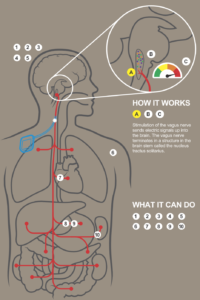Cardiac dysautonomia in depression – heart rate variability biofeedback as a potential add-on therapy
Kristen Sparrow • December 14, 2019

 This article suggests that the autonomic dysfunction found in patients with depression can lead to impaired cardiovascular function. They suggest HRV as an adjunct diagnostic tool in this situation. SSRI’s or anti-depressants may change the patient’s mental outlook, but do not address the cardiovascular effects of depression. Acupuncture for them!! (They do not come to the same conclusion, nor is it mentioned.) They are big proponents of biofeedback and it makes me want to revisit biofeedback as an ancillary technique.
This article suggests that the autonomic dysfunction found in patients with depression can lead to impaired cardiovascular function. They suggest HRV as an adjunct diagnostic tool in this situation. SSRI’s or anti-depressants may change the patient’s mental outlook, but do not address the cardiovascular effects of depression. Acupuncture for them!! (They do not come to the same conclusion, nor is it mentioned.) They are big proponents of biofeedback and it makes me want to revisit biofeedback as an ancillary technique.
The article has a terrific rundown of the physiology involved in depression and autonomic dysfunction.
Abstract
Depressive disorders are among the most important health problems and are predicted to constitute the leading cause of disease burden by the year 2030. Aside significant impact on quality of life, psychosocial well-being and socioeconomic status of affected patients, depression is associated with impaired cardiovascular health and increased mortality. The link between affective and cardiovascular disease has largely been attributed to dysregulation of the autonomic nervous system resulting in a chronic shift toward increased sympathetic and decreased parasympathetic activity and, consecutively, cardiac dysautonomia. Among proposed surrogate parameters to capture and quantitatively analyze this shift, heart rate variability (HRV) and baroreflex sensitivity have emerged as reliable tools. Attenuation of these parameters is frequently seen in patients suffering from depression and is closely linked to cardiovascular morbidity and mortality. Therefore, diagnostic and therapeutic strategies were designed to assess and counteract cardiac dysautonomia. While psychopharmacological treatment can effectively improve affective symptoms of depression, its effect on cardiac dysautonomia is limited. HRV biofeedback is a non-invasive technique which is based on a metronomic breathing technique to increase parasympathetic tone. While some small studies observed beneficial effects of HRV biofeedback on dysautonomia in patients with depressive disorders, larger confirmatory trials are lacking. We reviewed the current literature on cardiac dysautonomia in patients suffering from depression with a focus on the underlying pathophysiology as well as diagnostic workup and treatment.

